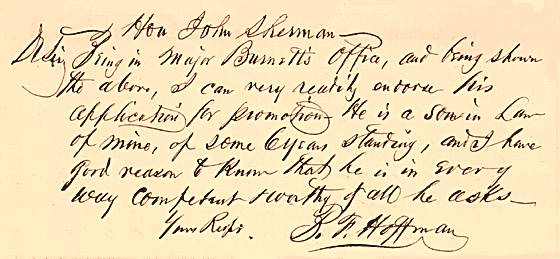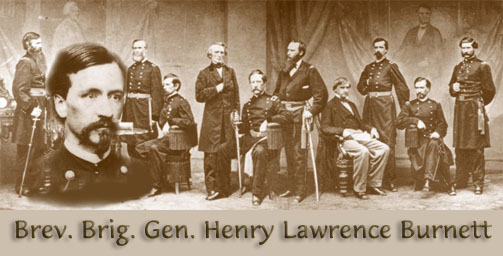Major to Brevet Colonel
|
But Burnett's connections couldn't get him the promotion that he'd wanted, and ambition
must have warred with worries at home when his third child was born and quickly died. Kitty, his
young wife, was ill, and the only way out Burnett could see was to resign from the army.
He'd already put in the three years he'd first enlisted for.
And so he tendered his resignation to Judge Holt, the man in charge of the Judge Advocate
Corps. But even if not enough to win him the promotions he'd wanted, his work had been
noticed and, when Judge Holt brought his plight to Secretary of War Stanton, Stanton
suggested that Burnett take an indefinite leave of absence.
But even with more time to spend on Kitty and his two small daughters, he couldn't argue
his way out of this situation. Kitty, his young wife of only twenty-one, died. And when Burnett
again took up his army responsibilities, he must have thrown himself into his work.
Given the Camp Douglas conspirators to try, Burnett was able to get convictions, and this
led to his being picked to try the Knights of the Golden Circle, another southern conspiracy.
In order to conduct the trials in Indianapolis
from his post in Cincinnati, Burnett had to take a train out in the morning, conduct the trial
during the day, then train back to Cincinnati and keep his department there running. It was
exhausting, but he was in his element. But it must have felt ironic that only now that he
no longer had a wife to support, was he able to get the promotion to Colonel.
Continue story
|
Judge Advocate Generals Office
April 18, 1864
Major H.L. Burnett
Judge Advocate
Major.
I am in receipt of your letter of the 15 inst. inclosing - addressed to the Adjutant General -- your resignation of the Office of Judge Advocate of the Department of the Ohio. Both of these communications have been laid before the Secretary of War who instructs me to express to you his sincere thanks for the zeal and ability with which you have performed the unusually perplexing and onerous public duties with which you have been charged. A-- as he does the afflicting circumstances in which you are so unhappily placed, he is nevertheless unwilling that your valuable services shall be lost to the Department. While therefore for the present he declines to accept your resignation, he directs me to say to you that he will grant you an indefinite leave of absence to begin as such day as you may name and to continue so long as in your judgement the condition of Mrs. Burnett's health shall require your attention. He greatly prefers this course to your withdrawal from the service and trusts that it will accord with your own feelings and sense of duty -- to your family.
Concurring, as I do fully, in the views of the Secretary and thanking you for and at the same time reciprocating the Kind sentiments with which your letter concludes, I remain very respectfully and
Truly Yours
(Signed) J. Holt
Judge Advocate General
[Note: Henry Burnett's first wife, Grace "Kitty" Hoffman, died June 28, 1864 in Covington, Kentucky.]
|
Youngstown O.
April 28th 1864
Col. Joseph Holt, Judge Advocate Genl
Washington City D.C.
Dear Colonel
Assuming that the Bill now pending in Congress providing, among other things, for the appointment of two assistants to the Judge Advocate General, with rank of Col. will become a Law, and that you will be placed at the head of the Department, from a desire of Duty to the Government and yourself, I recommend for the position of one of the assistants, Major Henry L. Burnett, formerly of this place, but now stationed at Cincinnati. I have known Mr Burnett from his infancy, and hence speak of him from personal knowledge.
As boy and man, he has ever evinced great energy of Character. He is an accomplished lawyer, and good scholar. His character for integrity & honor is not to be doubted. And, added to all this, the fact that he has seen much service in the Department over which you preside, I am confident that I hazard but little in assuring, that it will be difficult, if not impossible for the Government to find a more suitable man for the position, than Major Burnett.
Respectfully Yours

David Tod [Governor]
[Ed Note:
David Tod (1805-1868) was governor of Ohio from 1862-66. Previously a state
legislator, he had run for governor twice before in the 40's and been defeated.
Although he worked against the peace movement and draft resistance and was a strong
protector of Ohio's southern border against enemy raids, he was not reelected
governor, due to his weak support of the Emancipation Proclamation. Who was
who in the Union, p. 414]
|
Judge Advocate's Office
 Department of the Ohio and Northern Department Department of the Ohio and Northern Department
 Cincinnati, Cincinnati,
 May 4, 1864 May 4, 1864
Hon. John Sherman,
Senate Chamber,
Washington, D.C.
Sir:
I have handed to Captain Moulton to be forwarded to you an endorsement and recommendation of Governor Tod got for my promotion to one of the Assistant Judge Advocate General's positions. I herwith enclose you a copy of a letter recently received by me in answer to a tender of my resignation, that you may see that I stand fair with the Secretary of War and Colonel Holt. If my services are of such value to the Government, I, of course, am willing to stay and give the Government the benefit of my labor. But I do desire of course, and believe I have earned, honorable promotion. Did you but feel willing to take this letter of Governor Fod's in your hand, call upon Colonel Holt, get his endorsement on the letter, and then, by presenting it to the Secretary of War, --,
getting Colonel Holt's promise that he would do so, with your endorsement on the letter, my promotion would be secured. I need not say to you that by this act you would be doing me the greatest kindness and favor that I could ask at the hands of any man. I should hope in the coming years in some way to remember and repay in part my great debt.
Very respectfully,
Your object servant
H.L. Burnett
Judge Advocate D.O. and N.D.
[Ed Note:
John Sherman (1823-1900) was the brother of
William Tecumseh Sherman and one of the organizers of the Republican Party.
From 1855-1898, he served Ohio and the Federal Government as a Congressional representative,
Senator, Treasury Secretary, Secretary of State under McKinley. His lasting
contribution toward the laws of the land were the Sherman Anti-Trust Act and the Sherman
Silver Purchase Act. Who Was Who in the Union, p. 367]
|

 Hon John Sherman Hon John Sherman
D Sir
 Being in Major Burnett's office, and being shown the above, I can very readily endorse his application for promotion. He is a son in law of mine, of some 6 years standing, and I have good reason to know that he is in every way competent & worthy of all he asks.
Being in Major Burnett's office, and being shown the above, I can very readily endorse his application for promotion. He is a son in law of mine, of some 6 years standing, and I have good reason to know that he is in every way competent & worthy of all he asks.
 Yours Rspt Yours Rspt
 B.F. Hoffman B.F. Hoffman
|
To the Senate of the United States:
I nominate the person named in the accompanying communication for appointment in the Volunteer force, as proposed by the Secretary of War.
ABRAHAM LINCOLN.
Washington, March 8, 1865.
War Department,
Washington, March 8, 1865.
Sir: I have the honor to propose for your approbation the following-named person for appointment in the Volunteer force now in the service of the United States:
* To be colonel by brevet. Major Henry L. Burnett, judge-advocate U. S. Volunteers, for diligent and efficient service, to date from March 8, 1865.
I am, sir, with great respect, your obedient servant,
E. M. STANTON,
Secretary of War.
The President of the United States.
|

 War Department War Department
 Washington City Washington City
 May 1st 1865 May 1st 1865
A.F. Chalfin
Ast Adjt Genl
Washington City
Sir
I have the honor to acknowledge the receipt of my commission as Colonel by Brevet; and hereby accept the same. I am twenty eight years of age, reside at Cincinnati Ohio, was appointed Mar. 8th 1865, was born in Ohio and my full name is as subscribed.
Very Respy
Your Obt. Svt.
Henry Lawrence Burnett
Bvt. Col. & Judge Advocate
|
|










